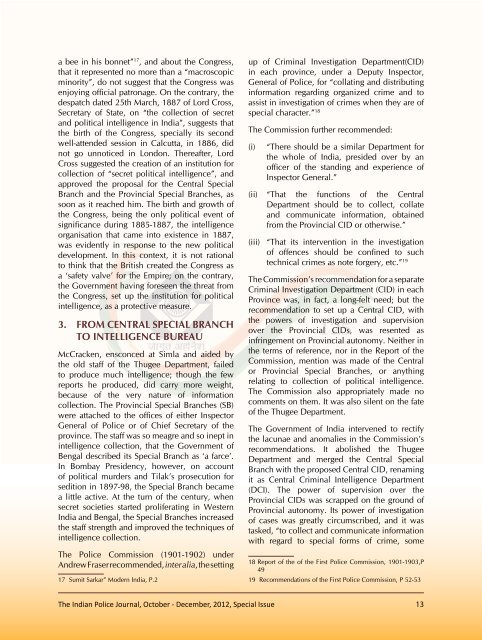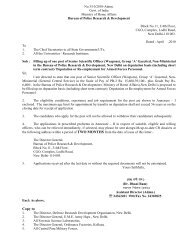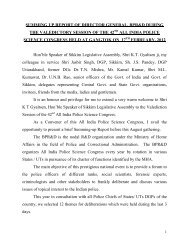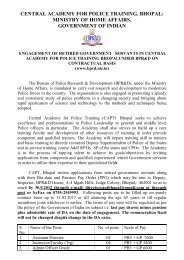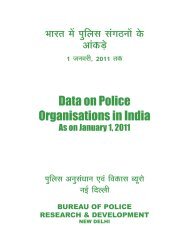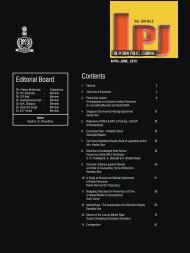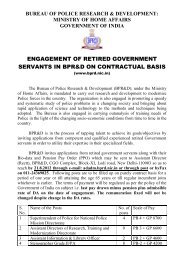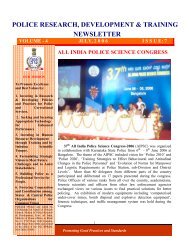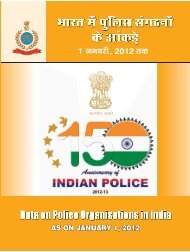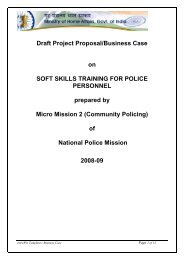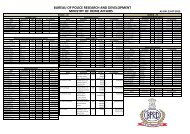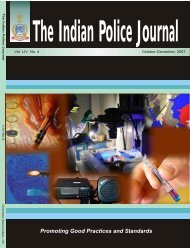<strong>and</strong> he ”will be called on to be present at theheadquarters <strong>of</strong> the Government at Calcutta orSimla, <strong>and</strong> that during the absence <strong>of</strong> the GeneralSuperintendent <strong>of</strong> the Thugee Departmenton tour, he will be obliged to conduct theresponsibilities <strong>and</strong> confidentialities <strong>of</strong> theSpecial Branch”. Its headquarters would be atSimla, but the Chief <strong>of</strong> the Special Branch wasto remain present at Calcutta, when required.Thus, the premier intelligence agency <strong>of</strong> thesub-continent 9 came into existence <strong>of</strong>ficially on23 rd December, 1887, when the Secretary <strong>of</strong>State approved the proposal “for improvingthe means <strong>of</strong> obtaining secret <strong>and</strong> politicalintelligence” 10 .Two pertinent questions, related to the settingup <strong>of</strong> the institution for collection <strong>of</strong> secretpolitical intelligence, may be briefly touchedupon here. It has <strong>of</strong>ten been contended that“Victorian statesmen held espionage in absoluteabhorrence,” 11 <strong>and</strong> so the people at the topechelons <strong>of</strong> the administration in Engl<strong>and</strong>, asalso in India, were not in favour <strong>of</strong> setting upan institutionalised intelligence system, lest theGovernment <strong>of</strong> India should earn the opprobrium<strong>of</strong> being despotic. But such scruples were not inevidence in the accounts <strong>of</strong> the Crimean War(1856), the annexation <strong>of</strong> Oudh, <strong>and</strong> the first war<strong>of</strong> Indian independence, 1857, when spies wererecruited <strong>and</strong> used rampantly by the regiments<strong>and</strong> administrative <strong>of</strong>ficers. 12Thus, the so-called Victorian aversion to secretpolice or spy system appears to be a myth. Therewas, however, genuine apprehension in theGovernment, that the liberal democratic systemmight be stigmatised for too much reliance onsecret service <strong>and</strong> the administration might bebr<strong>and</strong>ed as despotic. Writing to Lord Cross on15th November,1887, Dufferin underscored thesecrecy <strong>of</strong> the communications, as “it would not9 Two other countries which emerged from the Indian Empire,namely Pakistan <strong>and</strong> Bangladesh have an unbroken continuity<strong>of</strong> the Intelligence <strong>Bureau</strong> (IB) for domestic intelligence.10 See Viceroy Dufferin’s Secret Dispatch No. 179 dated15.11.1887 <strong>and</strong> the Secretary <strong>of</strong> State/ Viscount Cross’sSecret Despatch No.31dated 23rd December, 188711 RichardJ.Popplewell: Intelligence <strong>and</strong> Imperial Defence;London, 1997,; P33-35. Patrick French in his ‘Liberty orDeath’ has endoesed the views <strong>of</strong> Popplewell.12 C.A.Baily: Information <strong>and</strong> the Empire;do for the native press to get it into their heads,that we were about to establish a Third Sectionafter the Russian pattern.” 13The second issue is, whether the establishment<strong>of</strong> a permanent institution for collection <strong>of</strong> secretpolitical intelligence, in December 1887, wasrelated to the foundation <strong>of</strong> the Indian NationalCongress in December, 1885. The Congress wasclaimed to have been founded by an Englishman,named Allan Octavian Hume (1829-1912) 14 ,in consultation with high British <strong>of</strong>ficials,including Lord Dufferin. It was later on allegedthat Hume, though a founder <strong>of</strong> the Congress,was undoubtedly pro-empire in his attitude<strong>and</strong> therefore sought the support <strong>of</strong> the Britishbureaucracy for the Congress. But, the fact isthat Hume was elected General Secretary <strong>of</strong> theCongress till 1908, <strong>and</strong> spared no pains to makeit a truly national party, capable <strong>of</strong> giving voice tonational aspirations, by inducting representativesfrom all communities <strong>and</strong> all province. Yet it is alsotrue, that “Before issuing the Congress Manifesto,Hume had consulted the Viceroy, Lord Dufferin<strong>and</strong> that it was on his suggestion that Hume hadgiven the organisation a political character.” 15That, perhaps, provoked Lajpat Rai to write thatthe British bureaucracy <strong>and</strong> Hume wanted theCongress to act as a “safety valve, for the escape<strong>of</strong> the great <strong>and</strong> growing forces generated byBritish connection.” Thereafter, many authorshave harped on this theme, <strong>and</strong> R. Palme Duttgave wide currency to it, as it became h<strong>and</strong>y forthe communists to prove that the Congress wasan ally <strong>of</strong> British imperialism.Historians 16 have proved, after painstakingsearch, that there is no evidence <strong>of</strong> ‘great <strong>and</strong>growing forces’ sweeping across India. Dufferin’sopinion about Hume, that he “seems to have got13 Dufferin to Lord Cross, dated 17 April, 1887. Third Sectionwas the notorious secret Russian <strong>Police</strong> <strong>and</strong> it was replacedby Okhrana in 1881.14 Hume retired as secretary <strong>of</strong> Agriculture <strong>and</strong> as such hadknowledge about the condition <strong>of</strong> the Indian peasantry. Inhis <strong>of</strong>ficial capacity he tried to reform Indian agriculture <strong>and</strong>was known as a kind-hearted <strong>of</strong>ficer.15 L.S.Rathore”A.O.Hume” The Origin <strong>of</strong> the new NationalMovement,P21-2216 Bipan Ch<strong>and</strong>ra, Aditya Mukherjee, K.N.Panikkar <strong>and</strong> SuchetaMahajan: India’s Struggle for Independence,1989. Theirsearch for materials to substantiate the “the great growingforces” has been noted in this book. Pp 60-6812The Indian <strong>Police</strong> Journal, October - December, 2012, Special Issue
a bee in his bonnet” 17 , <strong>and</strong> about the Congress,that it represented no more than a “macroscopicminority”, do not suggest that the Congress wasenjoying <strong>of</strong>ficial patronage. On the contrary, thedespatch dated 25th March, 1887 <strong>of</strong> Lord Cross,Secretary <strong>of</strong> State, on “the collection <strong>of</strong> secret<strong>and</strong> political intelligence in India”, suggests thatthe birth <strong>of</strong> the Congress, specially its secondwell-attended session in Calcutta, in 1886, didnot go unnoticed in London. Thereafter, LordCross suggested the creation <strong>of</strong> an institution forcollection <strong>of</strong> “secret political intelligence”, <strong>and</strong>approved the proposal for the Central SpecialBranch <strong>and</strong> the Provincial Special Branches, assoon as it reached him. The birth <strong>and</strong> growth <strong>of</strong>the Congress, being the only political event <strong>of</strong>significance during 1885-1887, the intelligenceorganisation that came into existence in 1887,was evidently in response to the new politicaldevelopment. In this context, it is not rationalto think that the British created the Congress asa ‘safety valve’ for the Empire; on the contrary,the Government having foreseen the threat fromthe Congress, set up the institution for politicalintelligence, as a protective measure.3. FROM CENTRAL SPECIAL BRANCHTO INTELLIGENCE BUREAUMcCracken, ensconced at Simla <strong>and</strong> aided bythe old staff <strong>of</strong> the Thugee Department, failedto produce much intelligence; though the fewreports he produced, did carry more weight,because <strong>of</strong> the very nature <strong>of</strong> informationcollection. The Provincial Special Branches (SB)were attached to the <strong>of</strong>fices <strong>of</strong> either InspectorGeneral <strong>of</strong> <strong>Police</strong> or <strong>of</strong> Chief Secretary <strong>of</strong> theprovince. The staff was so meagre <strong>and</strong> so inept inintelligence collection, that the Government <strong>of</strong>Bengal described its Special Branch as ‘a farce’.In Bombay Presidency, however, on account<strong>of</strong> political murders <strong>and</strong> Tilak’s prosecution forsedition in 1897-98, the Special Branch becamea little active. At the turn <strong>of</strong> the century, whensecret societies started proliferating in WesternIndia <strong>and</strong> Bengal, the Special Branches increasedthe staff strength <strong>and</strong> improved the techniques <strong>of</strong>intelligence collection.The <strong>Police</strong> Commission (1901-1902) underAndrew Fraser recommended, inter alia, the setting17 Sumit Sarkar” Modern India, P.2up <strong>of</strong> Criminal Investigation Department(CID)in each province, under a Deputy Inspector,General <strong>of</strong> <strong>Police</strong>, for “collating <strong>and</strong> distributinginformation regarding organized crime <strong>and</strong> toassist in investigation <strong>of</strong> crimes when they are <strong>of</strong>special character.” 18The Commission further recommended:(i)“There should be a similar Department forthe whole <strong>of</strong> India, presided over by an<strong>of</strong>ficer <strong>of</strong> the st<strong>and</strong>ing <strong>and</strong> experience <strong>of</strong>Inspector General.”(ii) “That the functions <strong>of</strong> the CentralDepartment should be to collect, collate<strong>and</strong> communicate information, obtainedfrom the Provincial CID or otherwise.”(iii) “That its intervention in the investigation<strong>of</strong> <strong>of</strong>fences should be confined to suchtechnical crimes as note forgery, etc.” 19The Commission’s recommendation for a separateCriminal Investigation Department (CID) in eachProvince was, in fact, a long-felt need; but therecommendation to set up a Central CID, withthe powers <strong>of</strong> investigation <strong>and</strong> supervisionover the Provincial CIDs, was resented asinfringement on Provincial autonomy. Neither inthe terms <strong>of</strong> reference, nor in the Report <strong>of</strong> theCommission, mention was made <strong>of</strong> the Centralor Provincial Special Branches, or anythingrelating to collection <strong>of</strong> political intelligence.The Commission also appropriately made nocomments on them. It was also silent on the fate<strong>of</strong> the Thugee Department.The Government <strong>of</strong> India intervened to rectifythe lacunae <strong>and</strong> anomalies in the Commission’srecommendations. It abolished the ThugeeDepartment <strong>and</strong> merged the Central SpecialBranch with the proposed Central CID, renamingit as Central Criminal Intelligence Department(DCI). The power <strong>of</strong> supervision over theProvincial CIDs was scrapped on the ground <strong>of</strong>Provincial autonomy. Its power <strong>of</strong> investigation<strong>of</strong> cases was greatly circumscribed, <strong>and</strong> it wastasked, “to collect <strong>and</strong> communicate informationwith regard to special forms <strong>of</strong> crime, some18 Report <strong>of</strong> the <strong>of</strong> the First <strong>Police</strong> Commission, 1901-1903,P4919 Recommendations <strong>of</strong> the First <strong>Police</strong> Commission, P 52-53The Indian <strong>Police</strong> Journal, October - December, 2012, Special Issue 13
- Page 1 and 2: The Indian Police JournalOctober -
- Page 3 and 4: From the Director’s DeskNew Delhi
- Page 5 and 6: 23rd December, 1887: TheJourney beg
- Page 7 and 8: Courtesy - National Archives of Ind
- Page 9 and 10: The Logo released on the completion
- Page 11 and 12: Helmsmen of the IB during thePre-In
- Page 13 and 14: SHRI V.G. VAIDYA, IPS(MAR 1992 TO J
- Page 15 and 16: “Sleeman sahib ki jai”“No Cri
- Page 17 and 18: their life and their problems relat
- Page 19 and 20: Settling down of criminal tribes wa
- Page 21 and 22: perish. Between 1841 and 1848, anot
- Page 23 and 24: In conclusion, I would like to reco
- Page 25: own race alone, had to be withdrawn
- Page 29 and 30: epresented by Tilak and his followe
- Page 31 and 32: The agency more and more fine-tuned
- Page 33 and 34: US was brewing, one William Hopkins
- Page 35 and 36: came under the control of Indian mi
- Page 37 and 38: neutralised many efforts by inimica
- Page 39 and 40: e published by the Intelligence Bur
- Page 41 and 42: As DD (Security), IB, I had occasio
- Page 43 and 44: Chhomohlohri, all of them juxtapose
- Page 45 and 46: Dormers Building, ShimlaThe Dormers
- Page 47 and 48: eforms. Warren Commission, on the a
- Page 49 and 50: and systems will increasingly come
- Page 51 and 52: violence and destabilisation. This
- Page 53 and 54: one develop. The all pervasive cult
- Page 55 and 56: etween the states and the centre su
- Page 57 and 58: Intelligence Agencies inIndian Demo
- Page 59 and 60: Democracies are, today, everywhere
- Page 61 and 62: depend substantially on the restrai
- Page 63 and 64: Of Pistols and Pigs andthe Old Tidd
- Page 65 and 66: it is lovingly caressed hundreds of
- Page 67 and 68: Through the Eyes of an IB OfficerSh
- Page 69 and 70: an Intelligence agency. He used to
- Page 71 and 72: My J&K ExperienceShri R.K. Kapoor,
- Page 73 and 74: there. We remained stranded there f
- Page 75 and 76: Scaling Himalayan Heights withthe I
- Page 77 and 78:
proceed to Dungti to supervise the
- Page 79 and 80:
tour of the White House and Lincoln
- Page 81 and 82:
into unconsciousness two hours earl
- Page 83 and 84:
which was completed successfully wi
- Page 85 and 86:
leaders. This happened around the t
- Page 87 and 88:
My Unforgettable Yearsin the North-
- Page 89 and 90:
stated that Prakash Singh, Assistan
- Page 91 and 92:
take her into confidence. That woul
- Page 93 and 94:
Police - Intelligence InterfaceShri
- Page 95 and 96:
Shreekant Bapat and I surveyed the
- Page 97 and 98:
excellence, dedication and commitme
- Page 99 and 100:
Immigration, Inter-State Disputes,
- Page 101 and 102:
Observations on India’s State and
- Page 103 and 104:
assessments that arose after the ca
- Page 105 and 106:
levels. The deficiencies of one par
- Page 107 and 108:
of laying a network of useful roads
- Page 109 and 110:
Technology in Intelligence-Future S
- Page 111 and 112:
These are just some of the aspects
- Page 113 and 114:
Figure 6: Open Source Information o
- Page 115 and 116:
events) and inference from evidence
- Page 117 and 118:
9North Atlantic Treaty Organization
- Page 119 and 120:
Shri Dave was posted back to the lB
- Page 121 and 122:
He even suggested separate pay scal
- Page 123 and 124:
The Unsung HeroesThe Intelligence B


